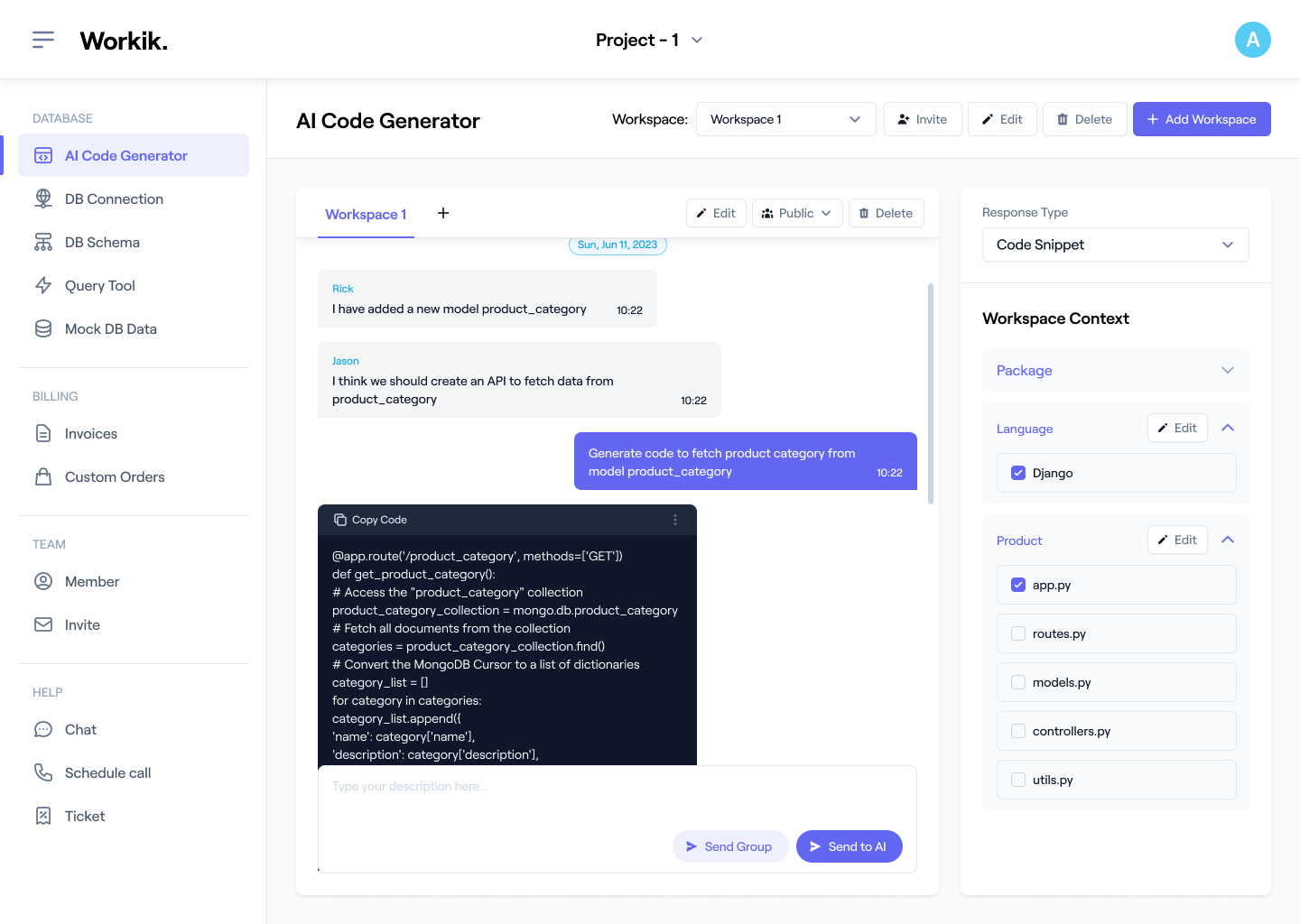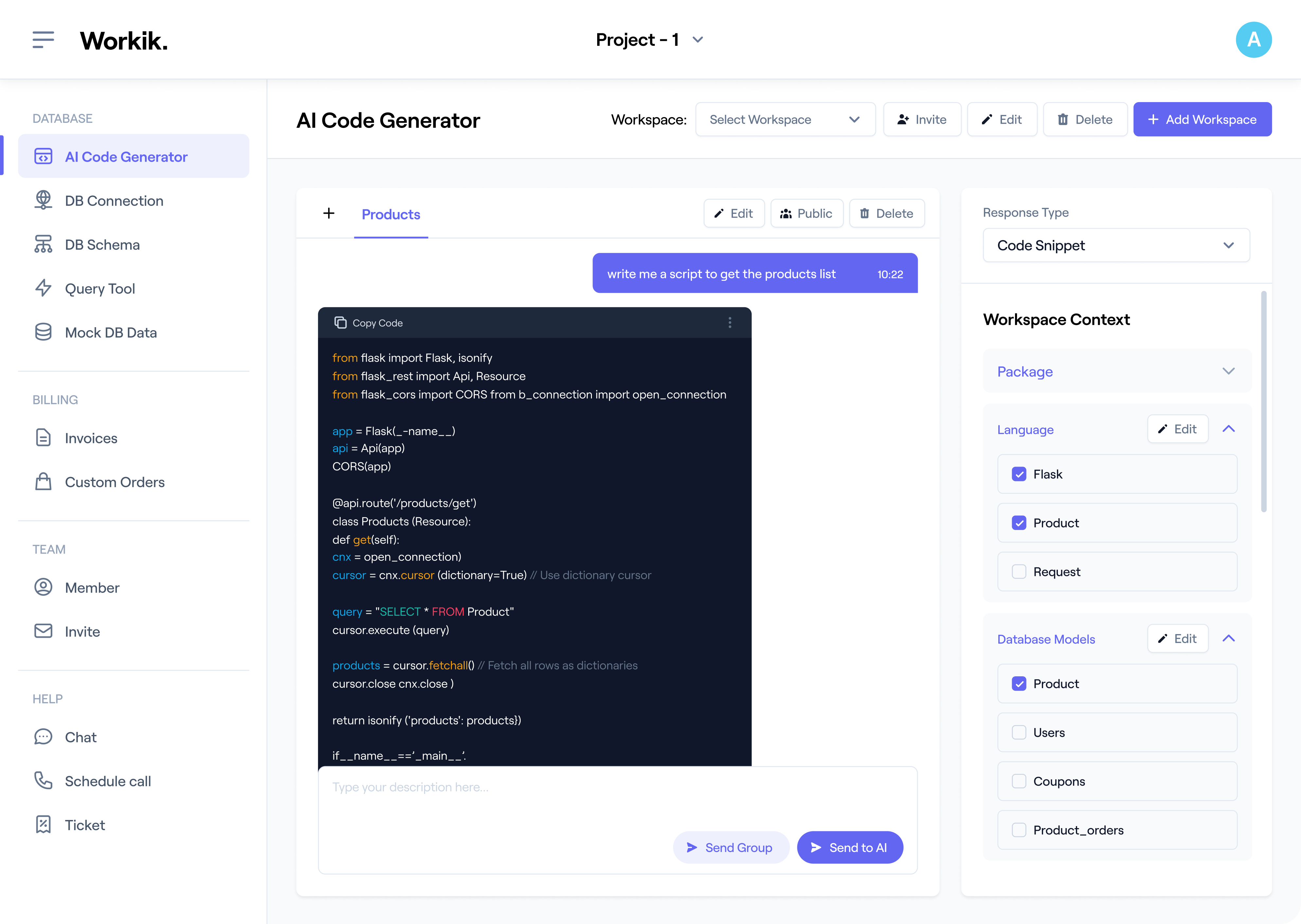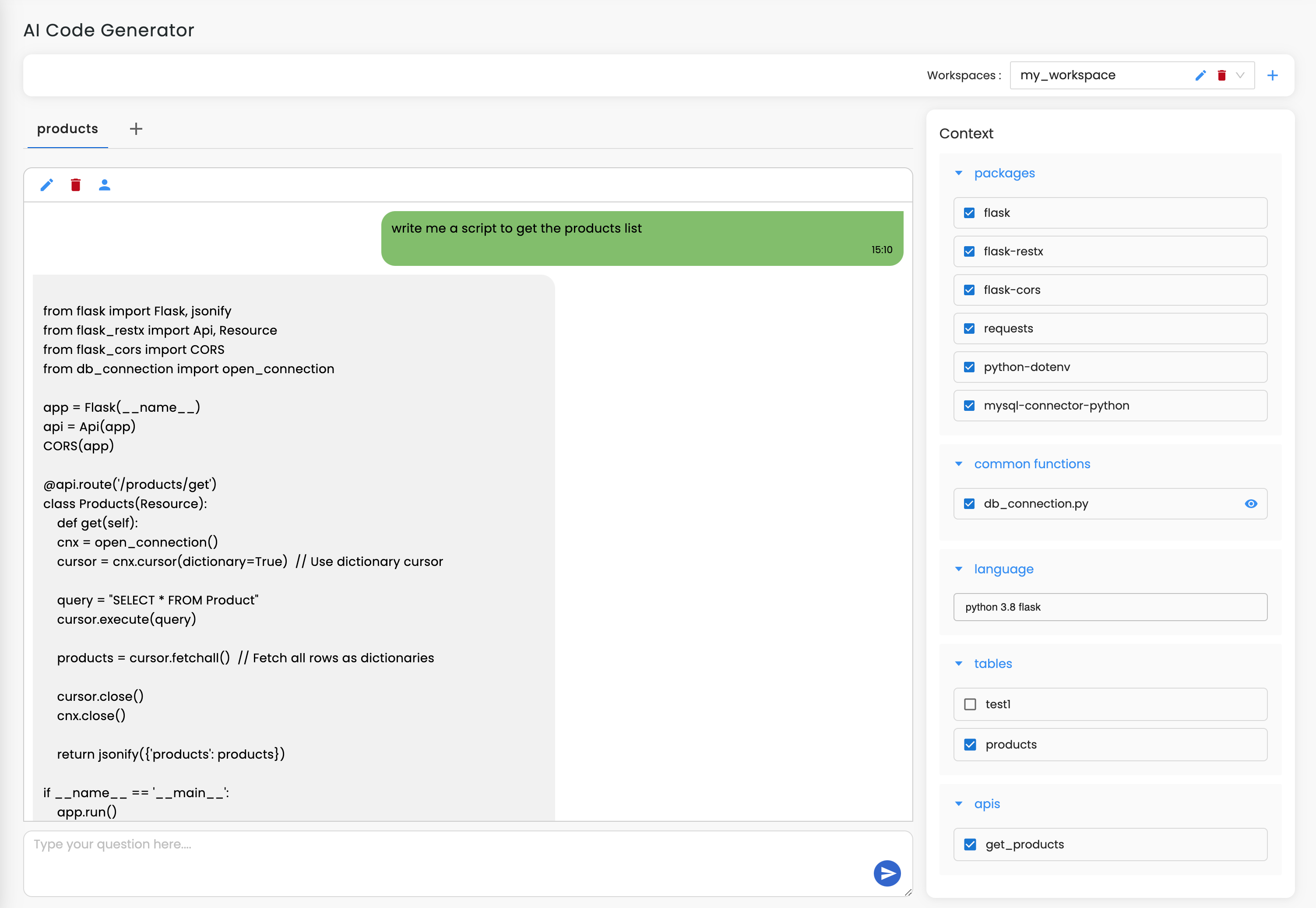
Join our community to see how developers are using Workik AI everyday.
Features

Implement Monad with AI
AI helps craft monads with mtl and transformers to ensure type safety and functional abstraction.

Streamline JSON Parsing
AI optimizes Aeson integration for efficient JSON serialization, encoding, and edge case handling.

Optimize Database Queries
Use AI to generate type-safe queries with Persistent, enhancing schema compatibility and performance.

Build RESTful APIs
AI assists in designing type-safe APIs with Servant for route generation and middleware integration.
How it works
Sign up at Workik with your Google account or manually enter your details to begin your Haskell development.
Import Haskell projects from GitHub, GitLab, or Bitbucket. Define modules, type classes, and monads. Specify libraries like QuickCheck, Aeson, or Warp for tailored AI assistance.
Use AI to generate code for data types, JSON handling, and APIs. Automate property-based tests, debug with actionable insights, and more to streamline functional programming.
Share AI-generated Haskell modules with your team in real-time, and deploy your app. Seamlessly manage integrations with servers, cloud services, or distributed systems for scalable solutions.


Expand
.png)
.png)
Expand


Expand


Expand


Expand


Expand


Expand


TESTIMONIALS
Real Stories, Real Results with Workik
Workik AI streamlined my API design with Servant, saving hours on backend work.

Mark Peterson
Backend Developer
The AI’s refactoring of Haskell monads with mtl has been pivotal for scalable architecture.

Elena Ramirez
Software Architect
Workik AI made learning Haskell seamless by automating tests with QuickCheck—perfect for beginners!

Amitabh Nair
Junior Developer
What are some popular use cases of Workik AI for Haskell code generator?


Popular use cases of Workik AI for developers include, but are not limited to:
* Generate reusable modules, including data types, monads, and type classes.
* Simplify JSON parsing and encoding with Aeson, generating boilerplate code for data structures.
* Automate the creation of type-safe APIs with Servant, including routing and middleware setup.
* Generate QuickCheck properties for property-based testing of Haskell functions and modules.
* Optimize GHC (Glasgow Haskell Compiler) performance by suggesting improvements in lazy evaluation and memory management.
* Set up testing frameworks like Hspec, generating unit and integration tests.
How does context-setting work in Workik for Haskell development?


Workik allows users to add any of the following diverse contexts for Haskell development:
* Link GitHub, GitLab, or Bitbucket repositories to integrate your Haskell codebase.
* Specify libraries like Aeson, Lens, or Persistent to guide AI in generating relevant code.
* Add database schemas or migrations to generate type-safe queries and CRUD operations.
* Include modules or helper functions to ensure AI aligns with your project’ structure.
* Define compiler flags or GHC extensions for tailored AI suggestions.
* Import test cases or property definitions to enhance automated QuickCheck and Hspec test generation.
How does Workik AI enhance Haskell code readability?


Workik AI restructures complex functions, simplifying recursive patterns, and providing clear naming suggestions for lambdas and type classes. For example, AI can refactor nested do blocks in monads into concise and modular functions.
Can Workik AI generate Haskell scripts for automation?


Yes, Workik AI helps in script generation for tasks like data processing, file manipulation, and web scraping with libraries like Conduit and HTTP-client. For instance, you can generate a script that downloads files, processes them lazily with streams, and uploads results to cloud storage.
Does Workik AI support advanced debugging techniques for Haskell?


Absolutely! Workik AI assists in pinpointing lazy evaluation bottlenecks, generating logs for thunks, and runtime performance profiling with tools like GHCi Debugger. It can also suggest specific Profiling flags to analyze memory leaks or performance regressions in your code.
How can Workik AI help in transitioning to a microservices architecture in Haskell?


Workik AI facilitates generating type-safe API contracts with Servant and recommending patterns for inter-service communication, such as gRPC or Message Queues. It can also help set up deployment-ready Docker containers tailored to your services.
Can Workik AI handle functional concurrency in Haskell?


Yes, Workik AI generates lightweight, non-blocking code using STM (Software Transactional Memory) and async libraries. For example, AI can generate patterns to manage shared resources safely while optimizing performance in high-load systems.
Generate Code For Free

Haskell: Question and Answer
Haskell is a purely functional, statically typed programming language known for its strong type system and lazy evaluation. It is widely used in academia, data analysis, and industries requiring high-performance computations or domain-specific applications. Haskell’s features like algebraic data types, type classes, and monads make it a preferred choice for tasks demanding functional programming paradigms.
Popular frameworks and libraries used in Haskell development include:
Web Development:
Yesod, Servant
Testing:
QuickCheck, Hspec
Data Processing:
Conduit, Pipes
JSON Parsing:
Aeson
Database Access:
Persistent, Esqueleto
Static Site Generation:
Hakyll
Functional Lenses:
Lens
Popular use cases of Haskell include:
Web Services:
Build type-safe REST APIs using Servant or Yesod.
Data Processing Pipelines:
Handle large data streams efficiently with Conduit or Pipes.
Financial Systems:
Implement high-performance, mathematically sound financial models.
Static Site Generation:
Create blogs or documentation sites using Hakyll.
Distributed Systems:
Develop scalable services using concurrency libraries like Async and STM.
DSLs:
Build domain-specific languages for specialized tasks, such as configuration management or scripting.
Career opportunities and technical roles available for Haskell professionals include Functional Programmer, Backend Developer (Haskell), Data Engineer, Software Architect, Blockchain Developer, and Academic Researcher.
Workik AI provides extensive Haskell development support, including:
Code Generation:
Creates Haskell modules, monads, and API contracts using Servant.
Debugging:
Identifies performance bottlenecks in lazy evaluation and offers optimized patterns for recursion.
Migration Assistance:
Aids in transitioning from imperative languages by rewriting code in idiomatic Haskell.
Optimization:
Suggests improvements in GHC configurations, concurrency patterns, and memory management.
Testing:
Automates property-based tests with QuickCheck and unit tests with Hspec.
API Integration:
Generates type-safe API interactions using Aeson and HTTP-client.
Static Analysis:
Highlights potential issues in type safety, purity violations, or unused code.
Deployment:
Simplifies CI/CD pipeline setup for deploying Haskell-based services or applications.
Explore more on Workik
Get in touch
Don't miss any updates of our product.
© Workik Inc. 2026 All rights reserved.

